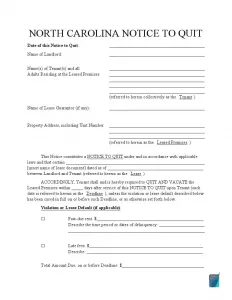North Carolina Eviction Notice Forms
When two sides of a leasing deal start to conflict, sometimes a question of renter’s eviction occurs. To complete this process legally in the United States, some documents are required. An eviction notice is one of such documents; it is an initial paper that you, as an owner of the premises, send to a renter that, in your opinion, needs to leave.
For downloading the correct form among North Carolina eviction notice templates, you can use our form building software.
Causes for eviction of a renter may vary from either a delay in rent payment or committing a crime on the leased premises (by a tenant) to a wish of a landlord to free the premises or another reason. Any of these causes require an eviction notice to start the process. An eviction notice is a legal way to ask a renter to leave before a landlord goes to court.
There are several details that a landlord as an author of an eviction notice has to include in the eviction notice template. Among them are the names of both a renter and a landlord, the day when a renter needs to finish the lease, and the address of the property given to a renter.
North Carolina Eviction Laws
The majority of laws that are tied to an eviction process of renters in North Carolina are added to Chapter 42 of the General Statutes. It is called “Landlord and Tenant” and is dedicated to the relations between these two subjects.
This Chapter also reveals the terms in which an owner should send a notice to a renter. For instance, in case of a payment delay, a landlord has to give a 10-day notice. When a landlord asks to move out due to his or her reasons, a renter should receive such a notice in no less than a period of seven days.
North Carolina Eviction Notice Laws Details
| Rent Grace Period | 5 days |
| Notice of Non-Payment | 10 days |
| Notice of Non-Compliance | Immediate |
| State Laws | North Carolina General Statutes, Chapter 42, Article 3 |
Eviction Notice Types Used in North Carolina
Because terms of notification and reasons for eviction vary, there is no unified template of such notice. Normally, landlords in North Carolina stick to these types of notices:
10-Day Notice to Quit (for Non-Payment)
To notify a renter about a planned eviction because he or she has not paid the rent in agreed terms, a landlord has to choose this type of eviction notice.
Immediate Notice to Quit (for Non-Compliance)
When a renter behaves inappropriately and does not respect the rules stated in a lease agreement, an owner should send this kind of an eviction notice without any time limitations.
7-Day Notice to Quit (for Month-to-Month Agreements)
Sometimes it is not the renter’s fault, and a landlord just needs the property empty. The situation requires such a notice, which should be delivered to a renter no less than seven days before the day he or she should vacate the space.

Eviction Process in North Carolina
Sometimes a renter is either stubborn or decides to ignore an eviction notice that you, as an owner, have transferred. In this case, you will need to start a trial in the court in your area. Check out our brief instructions below that will help you to finish the eviction successfully.
- Inform a Tenant about Eviction
When planning the eviction of a tenant, you should notify him or her with an eviction notice. Before you start the completion of this form, ensure you have chosen the correct template that fits the case in North Carolina.
- Claim in Court
In case a renter is not replying to a notice that you have sent, then it is time to go to the local court. You will have to gather a legal form mentioned below and pay the needed fees. After you have started the case in court officially, a tenant will receive notification from the sheriff.
- Go to the Hearing
The court should arrange the hearing and let you and a tenant know about the date. Both parties should attend the hearing.
- Get a Decision from the Court
A tenant may keep ignoring the notices; if he or she failed to arrive at the hearing, a landlord most likely would win the case. After this, a tenant should leave the leased space in no more than 10 days. Otherwise, the sheriff may arrive to evict a tenant forcefully.
Eviction Court Forms
When someone who is trying to evict a tenant decides to go to court, he or she has to prepare a document to apply and pay a certain fee. Also, there are other forms associated with the process of eviction. In North Carolina, the common documents for these cases are:
- “Writ of Possession Form”
The court will issue this document to the premises’ owner after the finish of the trial in case a landlord has proven the rights of possession, but a renter does not leave.
- “Complaint in Summary Ejectment Form”
When a landlord comes to court with a claim, he or she should submit this type of document.
- “Summons Form”
This form is issued when you, as an owner, have registered a case. The document also notifies a renter about the future legal process.

Looking for more North Carolina documents? We offer free templates and simple customization experience to everyone who prefers less hassle when facing paperwork.
